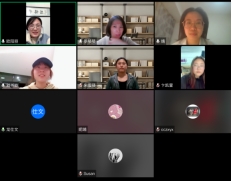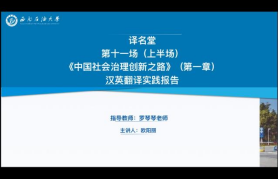汇报时间:2022年3月24日18:30-20:00
汇报地点:腾讯会议
汇报学生:欧阳丽
指导教师:罗琴琴
汇报题目:《中国社会创新之路》(第一章)汉英实践报告
参与导师:罗琴琴、龙仕文、何姗、陈婧
内容简介:
本次翻译报告中的翻译材料选自龚维斌主编的《中国社会治理创新之路》第一章。这本书的主题为新时代中国社会治理的新趋势,其阅读对象主要是专业的社会学研究人员和公务人员。第一章主要围绕社会治理主体的多元化展开,以 “党委领导、政府负责、社会协同、公众参与、法治保障”的社会治理体制为框架,重点论述了社会管理迈向社会治理理念的重要变革。
政治类文本用语正式,逻辑严密,风格独特,独有一定的深刻性、严肃性,翻译过程中需关注的难点之一在于中国特色词汇、引用的古文和长句的准确翻译,比如“国无常强,无常弱。奉法者强则国强,奉法者弱则过弱”的翻译。难点之二在于源语与目的语的语言环境和文化背景差异,正确传达译文信息并且使读者能够较好地理解译文所表达的意思,因而在翻译之前还需全面了解中外政治体制和社会治理方式的差异。难点之三在于避免译文的碎片化,保证全文的整体性和连贯性。
译文修改:
1. 党的十八届三中全会从推进国家治理体系和治理能力现代化的战略高度,提出了加强党委领导,发挥政府主导作用,鼓励和支持社会各方面参与,实现政府治理和社会自我调节、居民自治良性互动的创新社会治理的战略要求。(长句,多个动词的安置)
TT1:The third Plenary Session of the 18th CPC Central Committee, from the strategic height of promoting the modernization of national governance system and governance capacity, put forward the strategic requirements of strengthening the leadership of the Party Committee, giving play to the leading role of the government, encouraging and supporting the participation of all sectors of society, and realizing the positive interaction between government governance and social self-regulation and resident autonomy.
TT2:From the strategic perspective of modernizing of national governance system and capacity, the third Plenary Session of the 18th CPC Central Committee put forward requirements of innovating social governance: to strengthen the leadership of the Party Committee, give play to the leading role of the government, encouraging and supporting the participation of all parties in society to realize the requirement of the positive interaction between government governance, social self-regulation and resident autonomy.
TT3: From the strategic perspective of modernizing of national governance system and capacity, the third Plenary Session of the 18th CPC Central Committee put forward requirements of reforming social governance system: the Party committees exercise leadership, government assumes responsibility, and non-governmental actors get involved, to realize the positive interaction requirement of social governance innovation among government governance, social self-regulation and resident autonomy.
研讨反思:研讨前,我理不清句子的逻辑,认为所有的短句都是平行的,所以把它们翻译成了并列关系,而且还漏译了句尾的“创新社会治理”。与老师们讨论之后,一致认为提出的“加强”“发挥”“鼓励和支持”是平行的,是提出的措施,后面的“实现”是目的,应该用to 衔接最后的目的。也补译了句尾的“创新社会治理”。
2. 党的十九大进一步提出,要完善 “党委领导、政府负责、社会协同、公众参与、法治保障”的社会治理体制,构建全民共建共治共享的社会治理格局。
TT1:The 19th National Congress of the Communist Party of China further proposed that to improve the social governance system which led by the party committee, governed by the government, cooperated by the society and participated by the public, to build a social governance pattern featuring joint contribution and governance and shared benefits by the whole people.
TT2: The 19th CPC National Congress proposed that we will improve the law-based social governance model under which Party committees exercise leadership, government assumes responsibility, non-governmental actors provide assistance, and the public get involved, to establish a social governance system based on collaboration, participation, and common interests.
研讨反思:研讨前,我不知道“党委领导、政府负责、社会协同、公众参与、法治保障”的标准译法,经过老师的推荐,我在《治国理政》英文版找到了原文的译法,根据李长栓《非文学翻译与实践》中“成语优先”原则,选用已有的官方出版书籍上的译法。
3. 习近平同志指出,“不论过去、现在和将来,我们都要坚持一切为了群众,一切依靠群众,从群众中来,到群众中去,把党的主张变为群众的自觉行动,把群众路线贯彻到治国理政全部活动之中。”
TT1: Comrade Xi Jinping pointed out that “No matter in the past, now and future, we must insist on the principle of doing everything for the masses, by the masses, from the masses and toward/to the masses, to turn the Party’s propositions into the conscious.”
TT2: As Xi Jingping said, “We have always been and will always be obligated to do everything in the interests of the people and rely on their strength, and carry out the principle of ‘from the people, to the people’, translating the Party’s policies into the people’s conscientious action and implementing the mass line in all government activities”.
研讨反思:研讨前,我不知道“一切为了群众,一切依靠群众,从群众中来,到群众中去”的标准译法,经过老师的推荐,我在《治国理政》英文版找到了原文的译法,根据李长栓《非文学翻译与实践》中“成语优先”原则,选用已有的官方出版书籍上的译法。
4. 这一时期党和政府主要工作重点是以经济建设为中心,各项工作均为经济建设服务,在市场化的改革中逐步放松管制、放宽政策。
TT1: During this period, the main focus of the Party and the government’s work was economic construction. All the work served for economic construction. In the process of market-based reform, the Party and government gradually reduce control in management and policies.
TT2: During this period, the Party and the government took economic development as the central task, and all the work served for economic development. In the process of market-based reform, the Party and government gradually reduce limitations in management and relax control in policies.
研讨反思:研讨前,我认为“放松管制、放宽政策”就是“放松管理和政策”,所以把两者合译,经过和老师们的讨论,我决定接受老师的建议,按照原文的结构分开翻译,并且适当增译,完整表达原意。
5. 古人云,“国无常强,无常弱。奉法者强则国强,奉法者弱则过弱”。
TT1: The ancients said, “Nations will not always be strong, nor will they always be weak. If those who enforce the law are resolute, the country will be strong. When the law enforcers are weak, the nation will be weak.”
TT2: As the saying goes, “A country will not always be strong, nor will it always be weak; it will be strong for strong enforcement of laws, also, it will be weak for weak enforcement of laws’.
TT3: Hanfei, an ideologist in the Warring States period, he wrote that “a country will not always be strong, nor will it always be weak; it will be strong for strong enforcement of laws, also, it will be weak for weak enforcement of laws” in his book Hanfeizi.
研讨反思:研讨前,我认为“古人云”就是一句套话,所以把它泛泛而译,经过和老师们的讨论,为了更完整清楚地表达出原文意思,要增加一些解释,通过资料查证,这句话是《韩非子》里面的名句,适当增加了这句话出处的介绍,并且遵从目的论连贯性原则,按照原文的风格,进行翻译,保留词汇的重复,强调奉法者强弱和国家强弱的关系。
6. “有国有家者,不患寡而患不均,不患贫而患不安。盖均无贫,和无寡,安无倾”。
TT1: No matter whether a prince who has a state or a minister who has a fiefdom, he was not worried about the lack of things but the uneven distribution, not about poverty but the social instability. If wealth is equal, there is no poverty; If people live in peace and unity, they don’t think the country is not populated enough; And a country will not be in danger if it is safe within its borders.
TT2: Confucius said in the Analects that “a nation or a family does not worry that it has little but that that little is unevenly apportioned, does not worry that it is poor but that it is unstable. Because with equitable distribution there is no real poverty, with harmony, no real scarcity, with stability, no real peril”.
研讨反思:研讨前,我直译出了这句话的意思,并没有补充文化背景和出处,经过和老师们的讨论,为了更完整清楚地表达出原文意思,要增加一些解释,通过资料查证,这句话是《论语》里面的名句,适当增加了这句话出处的介绍,并且遵从目的论连贯性原则,按照原文的风格,进行翻译,突出来了平均分配的重要性。
7. 政府是推进社会协同的关键主体,社会治理创新要更好地发挥政府在社会协同中的作用,首先要处理好政府 “掌舵”与社会 “划桨”的关系。
TT1: The government is the key subject to promote social coordination. In order to give full play to the role of the government in social coordination, we must first deal with the relationship between the government “steering” and the society “rowing”.
TT2: As a principal part of promoting social coordination, the government should play a better role in social coordination during innovation in social governance; first of all, we should coordinate the duties assignment of “steering” and “rowing” between the government and the society.
研讨反思:研讨前,我直译了“政府 ‘掌舵’与社会 ‘划桨’”,但这句话是一个双关,并不是表面的掌舵和划桨,而是强调政府和社会各司其职,做好职责的分配。这里选择直译,外国读者可能觉得莫名其妙,根据和老师们的讨论,我决定增译出“掌舵”和“划桨”的内涵意思,兼顾原文和读者。


总结:整个研讨会进行得十分顺利,老师和同学们就原文中的中国特色词汇该如何让翻译的问题展开积极的研讨。由于政治类文本多引用传统文化典故,增加了原文理解难度和翻译表达难度。经过讨论,考虑到本文是政治外宣类文本,该文本主要是为了向外国读者传播中国社会治理,所以选择增译,既译出典故,又补充寓意,传播文化的同时也达到了让读者容易理解的目的。